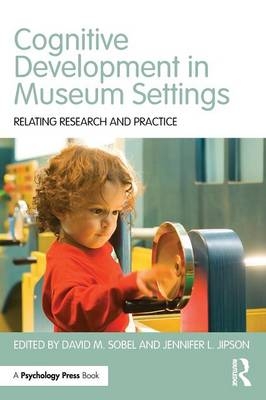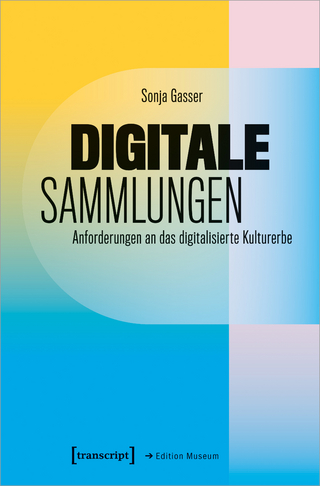
Cognitive Development in Museum Settings
Routledge (Verlag)
978-1-84872-489-1 (ISBN)
Researchers in cognitive development are gaining new insights into the ways in which children learn about the world. At the same time, there has been increased recognition of the important role that visits to informal learning institutions plays in supporting learning. Research and practice pursuits typically unfold independently and often with different goals and methods, making it difficult to make meaningful connections between laboratory research in cognitive development and practices in informal education. Recently, groundbreaking partnerships between researchers and practitioners have resulted in innovative strategies for linking findings in cognitive development together with goals critical to museum practitioners, such as exhibit evaluation and design.
Cognitive Development in Museum Settings offers an account of ways in which researchers in cognitive development partner with museum practitioners. Each chapter describes a partnership between academic researchers and museum practitioners and details their collaboration, the important research that has resulted from their partnership, and the benefits and challenges of maintaining their relationship. This approach illustrates cutting-edge developmental science, but also considers how researcher-practitioner interactions affect research outcomes and provide insight to questions common to practitioners. In addition, each set of researchers and practitioners discusses issues brought up by the partnership by posing questions concerning research-practice partnerships and research evidence, considering whether and how cognitive development research conducted in museum settings aligns with larger disciplinary interests in that field, and examining to what extent museum practitioners benefit from applying research on the development of cognitive processes to their educational practices.
David M. Sobel is a professor in the Department of Cognitive, Linguistic, and Psychological Sciences at Brown University. His research examines how children represent and learn causal knowledge and make inferences about their own and others’ mental states. Jennifer L. Jipson is an associate professor in the Department of Psychology and Child Development at California Polytechnic State University in San Luis Obispo. Her research investigates preschool children’s developing understandings within the domains of science, health, and technology, with a focus on how everyday interactions in informal settings contribute to children’s learning.
1. The Interaction between Research and Practice in Museum Settings: An Introduction and Synthesis Jipson and Sobel Section 1: Research/Practitioner Partnerships 2. Two Decades of Families Learning in a Children’s Museum: A Partnership of Research and Exhibit Development Callanan, Martin, and Luce 3. The Spiral Model: Integrating Research and Exhibit Development to Foster Conceptual Change Evans, Weiss, Lane, and Palmquist 4. The Living Laboratory® Model: A Mutual Professional Development Model for Museum-based Research Partnerships Corriveau, Kipling, Ronfard, Biarnes, Jeye, and Harris 5. Building Learning: Narrating Experiences in a Children’s Museum Haden, Cohen, Uttal, and Marcus 6. Learning about Science and Self: A Partnership between the Children’s Museum of Manhattan and the Psychology Department at New York University Rhodes and Bushara 7. Developing Mind Lab: A University-Museum Partnership to Explore the Process of Learning Sobel, Letourneau, and Meisner 8. Examining the Development of Scientific Reasoning in Context: A Museum and Laboratory Partnership Legare, Gose, and Guess Section 2: Discussion of Partnerships 9. Collaboration Is a Two-Way Street Gaskins 10. Research and Museum Partnerships: Key Components of Successful Collaborations Hadani and Walker 11. Wanted: A New Cultural Model for the Relationship between Research and Practice Bevan 12. Exploring Models of Research-Practice Partnership within a Single Institution: Two Kinds of Jointly Negotiated Research Allen and Gutwill Section 3: General Discussion 13. Curating Experience: The Role of Learner Agency in Museums and Schools and the Development of Adaptive Expertise Grotzer and Solis 14. Two Missions in Search of a Shared Culture Hirsh-Pasek and Golinkoff
| Zusatzinfo | 7 Tables, black and white |
|---|---|
| Verlagsort | London |
| Sprache | englisch |
| Maße | 152 x 229 mm |
| Gewicht | 340 g |
| Themenwelt | Kunst / Musik / Theater |
| Geisteswissenschaften ► Geschichte ► Hilfswissenschaften | |
| Geisteswissenschaften ► Psychologie ► Allgemeine Psychologie | |
| Geisteswissenschaften ► Psychologie ► Entwicklungspsychologie | |
| Geisteswissenschaften ► Psychologie ► Pädagogische Psychologie | |
| ISBN-10 | 1-84872-489-6 / 1848724896 |
| ISBN-13 | 978-1-84872-489-1 / 9781848724891 |
| Zustand | Neuware |
| Haben Sie eine Frage zum Produkt? |
aus dem Bereich


